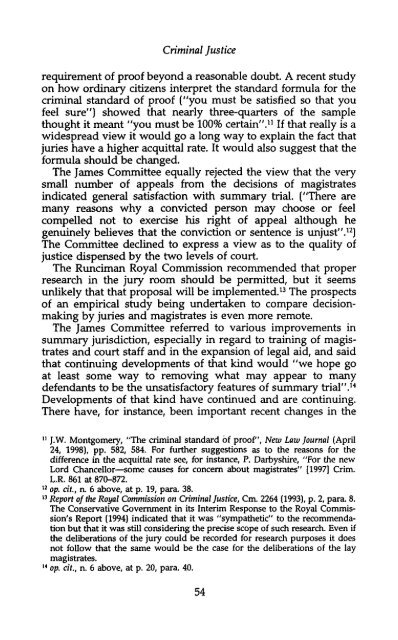HAMLYN - College of Social Sciences and International Studies ...
HAMLYN - College of Social Sciences and International Studies ...
HAMLYN - College of Social Sciences and International Studies ...
Create successful ePaper yourself
Turn your PDF publications into a flip-book with our unique Google optimized e-Paper software.
Criminal Justice<br />
requirement <strong>of</strong> pro<strong>of</strong> beyond a reasonable doubt. A recent study<br />
on how ordinary citizens interpret the st<strong>and</strong>ard formula for the<br />
criminal st<strong>and</strong>ard <strong>of</strong> pro<strong>of</strong> ("you must be satisfied so that you<br />
feel sure") showed that nearly three-quarters <strong>of</strong> the sample<br />
thought it meant "you must be 100% certain". 11 If that really is a<br />
widespread view it would go a long way to explain the fact that<br />
juries have a higher acquittal rate. It would also suggest that the<br />
formula should be changed.<br />
The James Committee equally rejected the view that the very<br />
small number <strong>of</strong> appeals from the decisions <strong>of</strong> magistrates<br />
indicated general satisfaction with summary trial. ("There are<br />
many reasons why a convicted person may choose or feel<br />
compelled not to exercise his right <strong>of</strong> appeal although he<br />
genuinely believes that the conviction or sentence is unjust". 12 )<br />
The Committee declined to express a view as to the quality <strong>of</strong><br />
justice dispensed by the two levels <strong>of</strong> court.<br />
The Runciman Royal Commission recommended that proper<br />
research in the jury room should be permitted, but it seems<br />
unlikely that that proposal will be implemented. 13 The prospects<br />
<strong>of</strong> an empirical study being undertaken to compare decisionmaking<br />
by juries <strong>and</strong> magistrates is even more remote.<br />
The James Committee referred to various improvements in<br />
summary jurisdiction, especially in regard to training <strong>of</strong> magistrates<br />
<strong>and</strong> court staff <strong>and</strong> in the expansion <strong>of</strong> legal aid, <strong>and</strong> said<br />
that continuing developments <strong>of</strong> that kind would "we hope go<br />
at least some way to removing what may appear to many<br />
defendants to be the unsatisfactory features <strong>of</strong> summary trial". 14<br />
Developments <strong>of</strong> that kind have continued <strong>and</strong> are continuing.<br />
There have, for instance, been important recent changes in the<br />
11 J.W. Montgomery, "The criminal st<strong>and</strong>ard <strong>of</strong> pro<strong>of</strong>", New Law Journal (April<br />
24, 1998), pp. 582, 584. For further suggestions as to the reasons for the<br />
difference in the acquittal rate see, for instance, P. Darbyshire, "For the new<br />
Lord Chancellor—some causes for concern about magistrates" [1997] Crim.<br />
L.R. 861 at 870-872.<br />
12 op. cit., n. 6 above, at p. 19, para. 38.<br />
13 Report <strong>of</strong> the Royal Commission on Criminal Justice, Cm. 2264 (1993), p. 2, para. 8.<br />
The Conservative Government in its Interim Response to the Royal Commission's<br />
Report (1994) indicated that it was "sympathetic" to the recommendation<br />
but that it was still considering the precise scope <strong>of</strong> such research. Even if<br />
the deliberations <strong>of</strong> the jury could be recorded for research purposes it does<br />
not follow that the same would be the case for the deliberations <strong>of</strong> the lay<br />
magistrates.<br />
14 op. cit., n. 6 above, at p. 20, para. 40.<br />
54

















